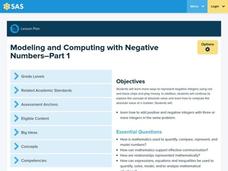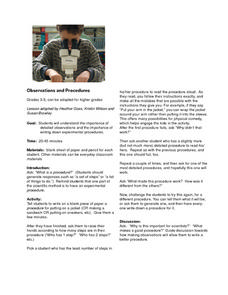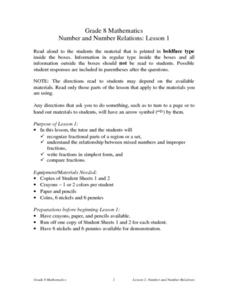Curated OER
Fraction and Decimal Ordering
Ordering numbers just got physical! Learners practice putting numbers in sequence, both in fraction and decimal form. To begin, they line up in birthday order and discuss the difference between ascending and descending. They are then...
Curated OER
Oral Presentation
Practice public speaking in this oral presentation lesson. Middle schoolers list the characteristics of a powerful speaker. They watch a video of two speakers, compare them and discuss the qualities of a good speech. Afterwards, they...
Curated OER
Recognizing and Extending Number Sequences
Number sequences and pattern recognition are vital skills for understanding more complex mathematical concepts. Practice determining the rule with your class. Each slide shows a sequence of numbers, they need to work together to find the...
Curated OER
Divisibility Tests
It's not a short cut, just good old fashion number sense, but kids will love it. This presentation does a wonderful job describing the divisibility rules by showing how each one works, reviewing the rules as a collective and providing an...
Curated OER
Odd And Even Numbers
Second and third graders identify odd and even numbers. They analyze a group of numbers and circle the odd number in each group. Pupils do the same with even numbers. This page has no explanation and there are no examples. Prior...
Curated OER
Fractals Teachers' Notes
When you see a flower or a tree in nature do you see the math? This web resource contains many ideas for using fractals in a math class including Sierpinski’s triangle, Koch's Snowflake, and the Jurassic Park Fractal. Additionally, it...
Curated OER
Dividing with Fractions
Use paper strips or models to relate division problems to division of fraction problems. Since the materials can be broken up, it helps them to show how they can complete repeated subtraction with fractions and not just whole numbers.
Curated OER
Linking Number Patterns and Algebraic Expressions
Examine algebra using digital resources! Budding mathematicians will watch Cyberchase episode segments that propose a problem. Using information gathered from the video, they practice recording number patterns in several different ways:...
Curated OER
Math Series: Number Patterns
The focus of this math lesson is representing numbers in different ways. Young mathematicians practice putting numbers into sets, and arriving at answers in new ways. For example, they are asked to, "Show me how to get 7 eyes." A...
Curated OER
Learning about Fibonacci
In this learning about Fibonacci worksheet, students read about Leonardo Fibonacci and his contribution to mathematics, then study the pattern of Fibonacci numbers, in math and in nature.
Curated OER
Number Patterns
An easy way to introduce numerical patterns, these activities can be made simpler by using addition, or more difficult with division, fractions, and percentages. Children examine patterns and determine the missing number in the sequence....
Curated OER
Patterns and Algebraic Expressions
Scholars will solve problems, create patterns, and write algebraic expressions. In addition, they will learn how to represent a number with a variable.
Curated OER
Introduction to Limits
High schoolers practice using graphing calculators and spreadsheets as they explore numeric limits using sequences and functions. They complete a sequencing worksheet, and determine which sequence corresponds to story a story called...
Curated OER
Weather Fronts: Understanding the Movement of Air
Students study various types of weather fronts and what happens to air at different temperatures. In this investigative lesson students draw various weather fronts and show the movement of the air then they observe demonstrations...
Curated OER
Math Puzzles: Number Series
In this series of numbers worksheet, students complete the patterns of the number series they are given with one and two digit numbers. Students complete 6 problems.
Curated OER
And Yet Another Number Patterns Challenge
In this number patterns worksheet, students solve 10 problems in which a sequence of 7 numbers is analyzed and the pattern determined. Students continue the pattern and write the next two numbers.
Curated OER
Number Patterns
In this sequencing worksheet, students examine a pattern made of circles and squares. They draw the next pattern in the sequence. They tell how many circles will be in the fifth pattern, and how many squares will be in the seventh...
Curated OER
Observations and Procedures
Young scientists critique the breakdown of detailed observations. They discover the importance of writing down experimental procedures. There are some guided discussion questions at the end of the resource.
Curated OER
Graph Paper Patterns
Young artists divide a piece of graph paper into sections using rectangles, squares, and triangles. They then fill each section with patterns of shape and color. Elementary graders describe how their patterns are organized. Secondary...
Curated OER
Number and Number Relations: Lesson 1
In a detailed format, this plan walks learners through an introduction to place value. They explore place value words and concepts and recognize patterns in the number system. Students identify a number when given a number word. They use...
Curated OER
Five Quick Games Build Reading Skills
Build reading skills with these five quick games! Whether you're hoping to build grammar, syllabication, or word recognition skills, this resource has options for you. Kids will love taking a break from the mundane to play these...
Curated OER
My Test Book: Math Review
Test that number sense with this 10 question quiz. This quiz contains 10 questions intended to assess how well second graders understand standard form, expanded form, number patterns, and numeric quantity or value.
Curated OER
Follow the Arrows
Use this resource to help describe how a number chart can be used to practice adding ten. Each time learners move to the right or down, 10 is added. They use the chart to answer the 7 questions.
Curated OER
Problem Solving Strategy: Use a Pattern
Pattern recognition is a skills that can help learners problem solve and build number sense. This simple worksheet requires kids to compete 5 number patterns.

























